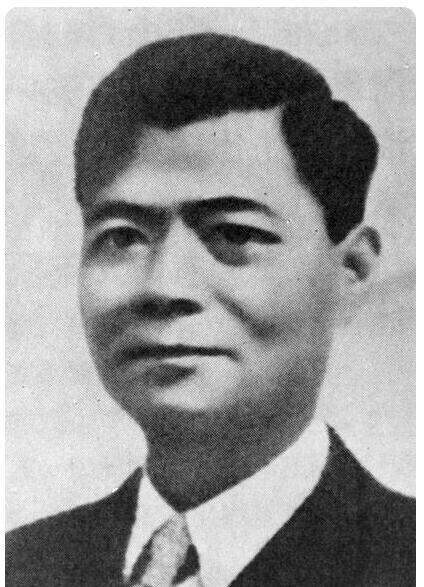
In Chen Celou Village, Chen Celou Town, Huangzhou District, Huanggang City, Hubei Province, there is a courtyard covered with pines and cypresses, which is the former residence of Chen Tanqiu, a major representative of the CPC and one of the founders of the party.
Chen Tanqiu, born in January 1896, is a native of Huanggang, Hubei Province. He was born into a family of cultivators, and his grandfather was a former Qing dynasty and was influential in the local area.
In 1916, Chen Tanqiu entered the English Department of the National Wuchang Higher Normal School. There, he read progressive publications, embraced progressive ideas, and vowed to "clarify this turbid world." In 1919, when the May Fourth Movement broke out, he actively participated in the anti-imperialist patriotic movement in Wuhan and became a pioneer of the student patriotic movement. In the summer of the same year, he attended the inaugural meeting of the All-China Federation of Students, met Dong Biwu in Shanghai, and the two saw each other at first sight and established a like-minded revolutionary friendship. In the autumn of 1920, under the leadership of the two men, the early organization of the Communist Party of China was established in Wuhan, and the two became the earliest members of the Communist Party of China. In July 1921, Chen Tanqiu attended the First National Congress of the Communist Party of China and, together with other delegates, fulfilled the great historical mission of founding the Communist Party of China.
In the spring of 1922, Chen Tanqiu came to Wuchang Higher Normal Affiliated Primary School to teach, and under his training, a large number of students embarked on the revolutionary road. In 1923, he participated in the launching and leadership of the vigorous Beijing-Hankou railway workers' strike, and later went to Anyuan to engage in the workers' movement and party building work.
After the defeat of the Great Revolution, under the harsh white terror, Chen Tanqiu persisted in secret struggle, successively serving as secretary of the Jiangxi Provincial CPC Committee, responsible person of the Provisional Provincial CPC Committee of Shandong, secretary of the Manchurian Provincial CPC Committee, and alternate members of the Fifth and Sixth Central Committees of the CPC, leading the workers' movement, student movement, and military movement work in various localities, and running around for the party's cause.
At the beginning of 1933, Chen Tanqiu came to work in the Central Soviet Region and later served as the secretary of the Fujian Provincial Party Committee. In January of the following year, at the Second Congress of the Chinese Soviet Republic in Ruijin, he was elected as a member of the Central Executive Committee and Minister of Food of the Central Government.
In October 1934, after the main force of the Central Red Army began the Long March, Chen Tanqiu remained in the Central Soviet Region to persist in guerrilla warfare, and served as a member of the Central Branch of the Central Bureau of the Communist Party of China and the head of the organization. In guerrilla warfare, he took the lead as a soldier and charged with a gun with the courage of a warrior, and was wounded in battle.
In August 1935, Chen Tanqiu went to Moscow to attend the Seventh Congress of the Communist International, and later participated in the work of the delegation of the Communist Party of China to the Communist International. In May 1939, he was ordered to return to China, under the pseudonym Xu Jie, as the representative of the CPC Central Committee in Xinjiang and the head of the eighth route army office in Xinjiang, and waged a reasonable, beneficial and disciplined struggle against the Xinjiang warlord Sheng Shicai, making outstanding contributions to the development of Xinjiang's economic and cultural construction and the launching of the Anti-Japanese Salvation Movement.
In 1942, Sheng Shicai openly defected to Chiang Kai-shek and embarked on the anti-communist road. In the summer of the same year, the Party Central Committee agreed to evacuate all Communists working in Xinjiang. Chen Tanqiu put himself in the last batch of evacuation lists and said: "I am the leader here, as long as there is one more comrade, I cannot leave." On September 17, Chen Tanqiu was arrested. In prison, the enemy tortured him inhumanely and forced him to "break away from the party", but he always remained righteous and unyielding.
On September 27, 1943, Chen Tanqiu was secretly killed by Sheng Shicai at the age of 47. Due to the isolation of information, he was still elected a member of the Central Committee at the Seventh Party Congress in 1945.
After the founding of the People's Republic of China, Chen Tanqiu's remains were buried in the Martyrs' Cemetery in the southern suburbs of Urumqi, Xinjiang Uygur Autonomous Region, and the tombstone was personally inscribed by his revolutionary guide and close friend Dong Biwu: Tomb of Chen Tanqiu Martyr.
Revolutionary ideals are higher than heaven. Chen Tanqiu has been loyal to the party's cause all his life and has been waging a heroic struggle against darkness all his life, and his spirit of persistent conviction, loyalty to the party, persistence in struggle, and sacrificing his life for righteousness is always worthy of our admiration and study.
(Author Affilications:Central Academy of Party History and Literature)
Source: Party Building magazine